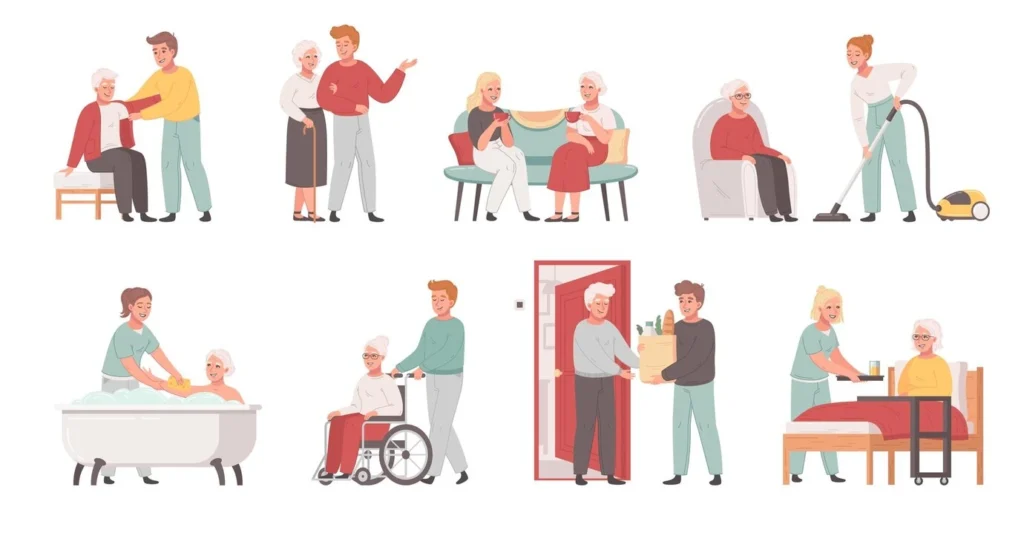1. What this guide covers
This guide explains:
- Typical costs for domiciliary care and private live-in carers in the UK (with Dartford context)
- Main funding routes: NHS Continuing Healthcare, local council support, benefits and grants
- How Kent/Dartford assess and charge for care and practical next steps (including Duty of Candour & transparenc
- Helpful tips to plan and reduce financial stress
2. Quick headline figures (2025)
- Minimum viable homecare price (industry guidance): Homecare Association minimum price for 2025/26 is £32.14 per hour (sector benchmark reflecting real cost pressures). homecareassociation.org.uk
- Typical hourly range (market): UK home care typically falls between £26–£38/hr depending on region and provider; London and some South-East areas can be at the top end. homecare.co.uk
- Live-in care day rate (typical): Live-in care market averages vary, but many sources and providers cite from £125–£250+ per day depending on complexity; agencies quote weekly packages often. (Live-in costs reflect 24/7 support and are higher than hourly visiting care.) Lottie
- Capital limits for council funding means test (2025–26): the lower capital limit is £14,250 and upper limit £23,250 (savings/capital above the upper limit normally mean you are expected to self-fund). GOV.UK
We can provide private live-in care in as little as 24 hours — for urgent arrangements please contact us directly.

3. Types of home care services & how costs compare
A. Visiting/home help (hourly domiciliary care)
- Typical uses: personal care, hygiene, medication prompts, shopping, companionship.
- Cost driver: intensity (minutes/hours), location, complexity (e.g. two-person assist), weekend/night calls.
B. Live-in care / full-time live-in carer
- A carer lives in the home offering 24/7 support. Ideal when constant supervision, companionship or complex care is needed. Often priced as a daily or weekly package. Live-in care keeps people at home rather than in a residential setting. Lottie
C. Respite & emergency respite care
- Short-term cover for family carers (holiday, illness) or emergency cover when usual care breaks down. Cost varies with duration and intensity.
D. Specialist & complex care
- Dementia, end-of-life/palliative, post-stroke or multi-morbidity care require higher skilled carers or nurse involvement — higher prices reflect training and clinical oversight.
4. Who pays? Funding routes explained (practical)
A. NHS Continuing Healthcare (CHC) — when the NHS pays
If an individual has a primary health need, the NHS may fund the full package (CHC this can include home care packages paid by the NHS. Eligibility is clinical and uses the national framework and Decision Support Tool. If eligible, NHS CHC can cover substantial costs. Check NHS advice and ask for an assessment. nhs.uk
Key action: ask your GP, community nurse, or local CCG/ICS for a CHC screening/assessment. If CHC is declined, you should receive a clear reason (Duty of Candour applies).
B. Local council funding (means-tested social care)
- Local authorities (Kent County Council for Dartford residents) carry out a financial assessment that looks at income and capital to determine what you pay. Some services are means-tested; others (information, assessment) are free. Kent’s 2025-26 charges and guidance detail the rates and thresholds. Kent County Council
- If you have savings below the lower capital limit you may receive council contribution; if above the upper limit you are likely classed as self-funding.
Key action: contact Kent County Council adult social care for a financial assessment and a care needs assessment. Under Duty of Candour, the council must communicate decisions clearly.
C. Benefits that help pay for care or living costs
- Attendance Allowance (for pension-age adults) — two weekly rates (2025): £73.90 or £110.40; can be used to fund home help. GOV.UK
- Personal Independence Payment (PIP) for under-state pension age — rates vary (check current PIP tables). Benefits and Work
- Carer’s Allowance for unpaid carers (2025 rate ~ £83.30/wk) — helps those caring 35+ hours/wk. Carers UK+1
Key action: claim any eligible benefits — they can be used to supplement care costs or pay for paid care.
D. Self-funding & private payment
Many families pay privately (self-fund) for domiciliary or live-in care. Private payers have the most choice of providers, flexibility in scheduling and can access private live-in carers quickly (some providers such as Ola Prestige Care can arrange care within 24 hours).
E. Other options: grants, charities, and veterans’ benefits
- Local charities, faith groups, and national charities sometimes offer grants for equipment or short-term support.
- Veterans may be eligible for specific financial help through Veterans UK or SSAFA.
F. Deferred Payment Agreements and property
If you own your home but need to defer selling it, the council’s Deferred Payment Scheme can allow you to delay selling your property to pay for care fees (usually for care home fees rather than domiciliary care, but still worth checking). MoneyHelper and local authority pages explain the scheme.

5. Dartford & Kent specifics — local practical tips
- Kent County Council publishes an adult social care charges booklet for 2025–26 — essential reading for Dartford residents to understand local charging and financial assessment processes. Kent County Council
- Dartford Borough Council fees & charges are published online for local services — check the current PDF for any local day-centres or community support charges. Dartford Borough Council
Local tip: If your needs are urgent (hospital discharge or crisis), ask for an urgent assessment from social services, this may speed up support. Also ask explicitly about fast-track NHS CHC if the clinical team considers the case urgent.
6. Illustrative Home Care Example:
(Use these as a planning guide — local prices vary)
- 2 x 1-hour visits daily (basic personal care): 14–28 hours/wk @ £30/hr = £420–£840 per week.
- Live-in care (single carer): typical rates widely vary; packages often quoted as £900–£1,400+ per week depending on complexity and location (South-East tends higher). Lottie
- Short emergency respite (several days): depends on provider & intensity — ask for a clear quote and what’s included.
Remember: the Homecare Association minimum price guidance for 2025/26 is £32.14/hr, reflecting fair wages and sustainable care delivery. homecareassociation.org.uk
7. How to reduce costs and make a plan
- Check benefits first: Attendance Allowance / PIP / Carer’s Allowance. GOV.UK
- Ask for a financial assessment from Kent County Council — knowing your banding is the first step. Kent County Council
- Explore NHS CHC if needs are primarily health related — ask your community nurse or GP for a referral. nhs.uk
- Compare private live-in carers vs visiting care — sometimes a tailored live-in package can be more cost-effective than multiple daily visits. homecare.co.uk
- Consider blended packages: some families use council support plus top-up private care to get the best outcome. Confirm council policy about “top-ups” and formal agreements.
- Negotiate transparent costs: ensure providers itemise travel, mileage, sleep-in duties and PPE so you can compare like-for-like.
8. Duty of Candour & how providers should behave
Under the principle of Duty of Candour, all providers (and commissioners) should be open, honest and transparent about care decisions, costs, shortfalls or mistakes. When choosing a live-in care company or domiciliary provider in Dartford, look for:
- Clear written quotes and contracts
- Readable care plans and invoices
- A transparent complaints & incident policy
- Willingness to explain eligibility decisions (council/NHS) and signpost you to appeals or reviews
If something goes wrong, you should expect a prompt explanation, apology where appropriate, and a clear plan to put things right — this is central to trust and dignity in care.

9. Choosing a provider — checklist
- CQC-regulated and rated (check recent report)
- DBS checks & training for staff
- Clear pricing & what’s included (travel, sleep-ins, meds, equipment)
- References or local testimonials (Dartford community)
- Willingness to support your funding journey (CHC/sourcing forms)
- Evidence of Duty of Candour in policies and practice
10. Frequently Asked Questions (FAQ)
Can the council pay for care at home?
Yes. If you are assessed as eligible and pass a means test, your local authority (Kent) may contribute or provide services. If not eligible, they must explain the decision and signpost alternatives. Kent County Council
What is NHS Continuing Healthcare and could it apply at home?
NHS CHC funds packages where the person has a primary health need. It can fund care at home — request a CHC screening via your GP or community team. nhs.uk
Do benefits like Attendance Allowance have to be repaid?
No — Attendance Allowance and PIP are non-means-tested benefits paid to the individual; they do not have to be repaid and can help pay for care. GOV.UK
11. Next steps — practical checklist for Dartford families
- Get a clear needs assessment (contact Kent Adult Social Care). Kent County Council
- Apply / check eligibility for benefits (Attendance Allowance, PIP, Carer’s Allowance). GOV.UK
- Ask for CHC screening if your needs are clinical. nhs.uk
- Request written quotes from two or three providers (include private live-in carers and visiting packages).
- Ensure transparency — you should receive a written care plan, cost breakdown, and complaints process (Duty of Candour).
12. How Ola Prestige can help (local offer)
- Rapid live-in care packages — we can arrange private live-in carers in as little as 24 hours for urgent needs.
- Free guidance on funding — we support families through CHC conversations, council assessments and benefit checks (always with transparency and Duty of Candour).
- Tailored, compassionate care — nurse-led, CQC-regulated, and focused on dignity and emotional wellbeing.
Final note (Duty of Candour reminder)
We value transparency: you should always receive clear, honest information about eligibility, costs, and the care we provide. If anything is unclear, ask for it in writing — and expect a full explanation. That’s the standard families should demand.



